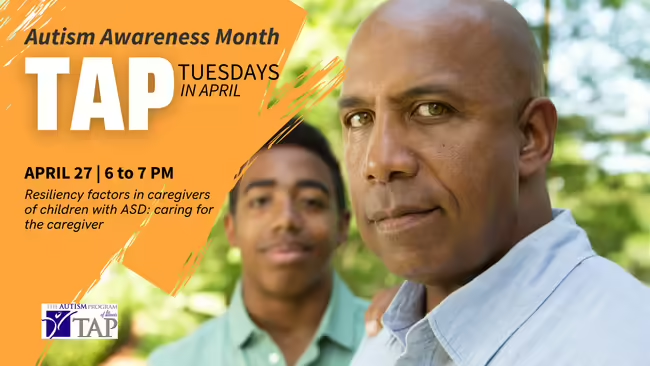
Autism Awareness Month: TAP Tuesdays in April
Resiliency factors in caregivers of children with ASD
Adaptive coping strategies and social and professional supports are important resilience factors that impact the well-being of caregivers and families of children with ASD. Explore the experiences and challenges caregivers face, and learn strategies to adapt against stress and further support and empower those caring for an individual on the autism spectrum.
Illinois Extension provides equal opportunities in programs and employment. If you need a reasonable accommodation to participate in programming, please contact program organizer: jjkramer@illinois.edu
TAP Tuesdays in April
April 6 | 6 to 7 p.m.
LAW ENFORCEMENT SAFETY FOR INDIVIDUALS WITH ASD
Register: go.illinois.edu/policesafety4-6
Individuals on the autism spectrum, as well as their caregivers, are invited to learn skills and techniques for safely interacting with law enforcement officers. The one-hour session provides participants an opportunity to apply learned skills to hypothetical situations. Presenter: B. Andi Lee
April 13 | 6 to 7 p.m.
NEURODIVERSITY IN YOUR UNIVERSITY
Register: go.illinois.edu/neurodiversity4-13
Explore what neurodiversity, particularly autism, looks like in the people around you, learn about characteristics of autism, and help cultivate an inclusive community where everyone is welcomed, celebrated, and respected. A panel of peers on the autism spectrum will answer questions about life experiences, encounters, and achievements. Presenter: Jeanne Kramer
April 20 | 6 to 7 p.m.
HEALTHY RELATIONSHIP EDUCATION: COMMUNICATING WITH YOUTH ON THE SPECTRUM
Register: go.illinois.edu/healthyrelationships4-20
Relationship education often excludes youth on the spectrum. As an adult supporting an adolescent on the spectrum, learn about emotions and barriers that can prevent open communication, and discover tangible resources and evidence-informed tips families and communities can use to address and help close the gap. Youth are also welcome to attend! Presenter: Agnes Rieger
April 27 | 6 to 7 p.m.
RESILIENCY FACTORS IN CAREGIVERS OF CHILDREN WITH ASD: CARING FOR CAREGIVERS
Register: go.illinois.edu/caregivercare4-27
Adaptive coping strategies and social and professional supports are important resilience factors that impact the well-being of caregivers and families of children with ASD. Explore the experiences and challenges caregivers face, and learn strategies to adapt against stress and further support and empower those caring for an individual on the autism spectrum.
About our partners:
The Autism Program (TAP) is an academic community partnership that focuses on providing a resource and referral center for parents and professionals; developing and evaluating model programs in training, treatment, and family support; and facilitating collaborations between agencies, schools, and individuals to enhance the community’s capacity and quality of services for individuals with autism spectrum disorders (ASD) and their families. Free resources available include phone support, resource room, new diagnosis orientation for families, social skills programs, training and technical assistance for professionals, and diagnostics.
Academic partners at University of Illinois at Urbana-Champaign include the Departments of Human Development and Family Studies, Special Education, Speech and Hearing Science, Psychological Services Center, and the School of Social Work. Community partners include local school districts and Carle Clinic. The Champaign-Urbana Autism Network, a parent-professional networking group, holds monthly meetings at the Family Resiliency Center.
Aaron Ebata, Extension faculty specialist and associate professor in Human Development and Family Studies at University of Illinois, applies community-based Extension strategies and technological innovations in supporting Illinois families, including those with young children and with children on the autism spectrum. He also investigates the impact of nature on family health and how family-based nature activities can promote strong family relationships.
Funding is provided in whole or in part by The Autism Program of Illinois and the Illinois Dept. of Human Services.
